By Beth David, Editor
The town of Acushnet is fighting mad. The Selectboard, Board of Health, Finance Committee, and a slew of residents are fuming about proposed regulations by the Mass. Department of Environmental Protection (DEP) that could result in individual residents paying tens of thousands of dollars out of pocket for septic system upgrades. The Selectboard held a public meeting on Thursday, 1/12/23 to inform and hear from residents about the proposed regulations. The comment period has been extended until 1/30/23, but town officials and residents say the comment period is just window dressing, and the regulations are already a done deal.
“Find out what happens if we say ‘no,’” demanded Board of Health member and civil engineer David Davignon, who called the proposed regulations “pure insanity.”
“It’s a joke,” he said at the meeting, noting that the science behind the changes is flawed.
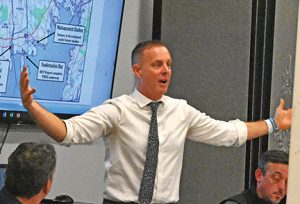
Acushnet Selectboard Chairperson David Wojnar speaks at a public meeting on 1/12/23 to inform residents and get feedback on the Mass. Department of Environmental Protection’s proposed Title 5 regulations that could cost individual homeowners in Acushnet tens of thousands of dollars to replace or upgrade septic systems. Photo by Beth David.
The proposed regulations are supposed to limit nitrogen going into local waterways, including the Acushnet River and anything that flows into it or is near it. Newly designated Nitrogen Sensitive Areas (NSAs) will be subject to the new regulations, which include limiting the amount of nitrogen that individual septic systems can discharge into the ground. The town will have five years to comply, meaning all septic systems will have to limit the amount of nitrogen discharged into the ground.
The other option is for the town to obtain a watershed permit, which would give it 20 years to comply. But the permit costs tens of thousands of dollars and requires hiring a consultant.
Mr. Davignon said the nitrogen load numbers are unrealistic, and the DEP has not even proven that septic systems are the problem. It is more likely that large treatment plants and large fertilizer users like farms and cranberry bogs are the real culprits, he said.
Mr. Davignon said DEP is going after individual homeowners because it is easier than going after the biggest offenders.
“These people are so arrogant,” said Mr. Davignon. “This is a tax without representation.”
He urged the Selectboard to consult with town counsel to find out what happens if the town and residents just refuse to comply.
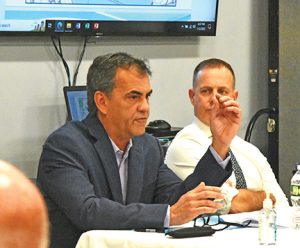
Acushnet Selectboard member Kevin Gaspar speaks while SB chairperson David Wojnar listens, at a public meeting on 1/12/23 to inform residents and get feedback on the Mass. Department of Environmental Protection’s proposed Title 5 regulations that could cost individual homeowners in Acushnet tens of thousands of dollars to replace or upgrade septic systems. Photo by Beth David.
He said that as a Board of Health member he would not enforce the new regulations. The BOH is an elected board in Acushnet.
Selectboard Chairperson David Wojnar told the group of about 50 that board wanted to inform residents, get feedback from residents, and let residents know that the town had an action plan to fight the regulations. He said they had contacted state legislators; prepared a form letter for residents to sign to send to representatives in Boston and the DEP. The town will use the comment period to send a video of the night’s meeting. He noted that Rep. Paul Schmid and a representative from Sen. Mark Montigny’s office were there.
Mr. Wojnar said the regulations were not a “done deal.”
“This is the democratic process at its best,” he said, noting how many people had shown up.
“So this is your meeting,” said Mr. Wojnar, adding it was an opportunity get “get stuff off your chest.”
Rep. Schmid said he was working with Rep. William Straus, who represents part of Acushnet.
“We are your team,” said Rep. Schmid.
He acknowledged that there is a nitrogen problem in the local waters and something needs to be done. He said, however, that DEP’s process was not good. He also said the state can help with some funds, and Acushnet can learn from what other towns have done.
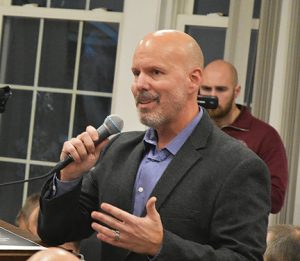
Acushnet Finance Committee member Mike Boucher speaks at a public meeting on 1/12/23 about the Mass. Department of Environmental Protection’s proposed Title 5 regulations that could cost individual homeowners in Acushnet tens of thousands of dollars to replace or upgrade septic systems. Photo by Beth David.
Finance Committee Chairperson Mike Boucher said residents will have to come up with $30-50K if the regulations go into effect.
“I am 100% against this,” said Mr. Boucher, saying he did not want to have to come up with the funding for the new regulations. “Especially if we do not even know if we’re contributing the problem.”
FinCom member Peter Benoit also spoke against the regulations, saying there is no fat left in Acushnet’s budget to come up with funding. He also said he felt it was already a done deal.
“You don’t find out about it until the vote is already taken,” said Mr. Benoit, adding that they need to stop the vote first and then find out if septic systems are even the problem.
The SB showed part of the 10/5/22 meeting, when DEP made a presentation to the board.
Mr. Wojnar encouraged everyone to sign the letter, saying even though it is a form letter, politicians take notice.
“Numbers count,” chimed in Rep. Schmid.
“We’ve got an action plan,” said Mr. Wojnar, and letters to politicians from individual residents are part of it.
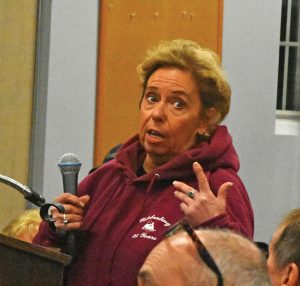
Acushnet resident Anita Davis, owner of Summer Winds Farm, speaks at a public meeting on 1/12/23 about the Mass. Department of Environmental Protection’s proposed Title 5 regulations that could cost individual homeowners in Acushnet tens of thousands of dollars to replace or upgrade septic systems. Photo by Beth David.
Anita Davis of Summer Winds Farms said Acushnet did not have many farms left. She said they are being developed into housing, and the homeowners use chemicals on their lawns.
“It has nothing to do with septic systems. DEP has missed the mark. They’re targeting the wrong people,” said Ms. Davis, adding that the “P” in DEP is for “protection. “They should protect us, not invade us.”
“Science is subjective,” said Kevin Smith, who has been battling PJ Keating over dust and chemical smells for years, and finds that DEP was no help in that fight.
Mr. Smith said the Cape towns got money for their Title 5 upgrades, so the rest of the state should, too. In any case, in 20 years the science will probably contradict itself anyway.
DEP has lost the public’s trust by failing to engage local leaders, said Mr. Wojnar, saying simply it is not fair, and they need to find a more balanced approach.
Mr. Davignon asked about the town’s Comprehensive Wastewater Management Plan. SB member Kevin Gaspar said it had been completed, for $300K, and it affords them the opportunity to apply for the watershed permit.
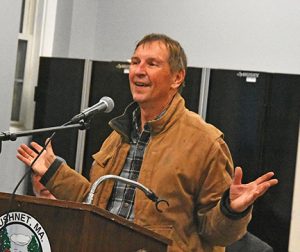
Acushnet resident Rick Ellis speaks at a public meeting on 1/12/23 about the Mass. Department of Environmental Protection’s proposed Title 5 regulations that could cost individual homeowners in Acushnet tens of thousands of dollars to replace or upgrade septic systems. Photo by Beth David.
“I don’t even know what to object to,” said Rick Ellis, noting that the state’s website does not even have all the NSA’s defined yet. Even if they did, he said, there are not enough contractors to convert all the systems, as noted on the state’s website.
“It’s a solution in search of a problem,” said Mr. Wojnar.
It is not just septic systems, said Jenn Thomas, so what else is DEP doing?
Mr. Wojnar said they did not know, but had their legislators asking DEP that question.
“None of it makes sense,” said Ms. Thomas.
SB member Kevin Gaspar read from the Buzzards Bay Coalition’s website, although he did not name them right away, where it outlines how wastewater treatment plants are large contributers to nitrogen pollution, and how the BBC has forced tougher regulations on nitrogen discharge.
“That’s the Coalition for Buzzards Bay [sic],” said Mr. Gaspar. “So I guess we know where some of the pressure has come from.”
He added that if everyone knows who the biggest offenders are, it should made sense to go after them and not individual homeowners. The state and federal government should be able to come up with funding to pay to upgrade the treatment plants, if they can spend trillions fighting foreign wars.
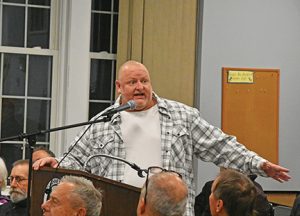
Acushnet Finance Committee member Peter Benoit speaks at a public meeting on 1/12/23 about the Mass. Department of Environmental Protection’s proposed Title 5 regulations that could cost individual homeowners in Acushnet tens of thousands of dollars to replace or upgrade septic systems. Photo by Beth David.
He said they should fix the nitrogen discharge at the treatment plants, then test in five years before “you jam it down our throats and say everyone’s doing a new septic system.”
At some point, Mr. Wojnar, getting a chuckle from the crowd, did remember to ask if there was anyone in the room in favor of the regulations. No one spoke up.
After the meeting Tony Fernandes, his wife Donna, Tony’s brother Rick and his wife Debbie discussed options, including simply refusing to comply.
Debbie Fernandes said they should print up “Just say no” lawn signs.
Tony said he was a commercial fisherman and saw how the treatment plant in New Bedford contributes to the pollution in the harbor, especially after rain storms. He said DEP does not want to take on the city, but figures that a small community like Acushnet will roll over.
Donna said there was no proof that private septic systems were the cause of the nitrogen.
Rick said if the state wants the upgrades, then the state should pay for them.
“They won’t go after the big plants,” Rick. “But they’ll attack the little people.”
When Debbie said some good people may decide to leave Acushnet, Tony countered, “How will they sell their property?”
“Basically, we’re screwed,” said Debbie.
Mr. Gaspar said he thought the meeting went well, and was happy to see so many people show up. If people do not get involved, they will get “screwed by big government.”
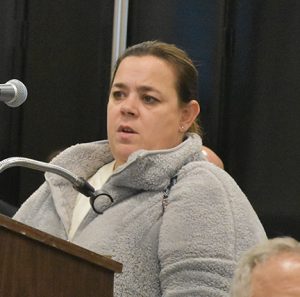
Acushnet resident Jenn Thomas speaks at a public meeting on 1/12/23 about the Mass. Department of Environmental Protection’s proposed Title 5 regulations that could cost individual homeowners in Acushnet tens of thousands of dollars to replace or upgrade septic systems. Photo by Beth David.
He said everyone wants clean water, but not at any cost, and pointed to solar farms clear cutting trees.
“It’s got to be a measured approach,” said Mr. Gaspar.
Mr. Wojnar agreed it was good to see the public and the legislators engaged. He said they need to voice strong opposition to the state.
“It’s a flawed process,” said Mr. Wojnar.
The plan is to submit a package to DEP during the formal comment period outlining the town’s opposition. They are also working with state legislators, he said, so Acushnet is protected.
SB member Bob Hinckley said he was happy the town held the public meeting, which gave people “the opportunity to do what DEP would not do for them.”
The meeting is available on the town’s YouTube channel at https:// www.youtube.com/watch?v=wMOMxfSk0-8. See page 7 for information on two upcoming DEP meetings and how to comment.
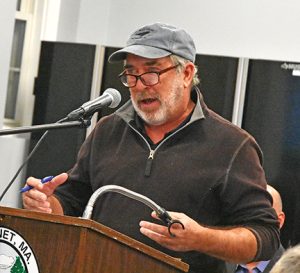
Acushnet resident and former SB member David Desroches speaks at a public meeting on 1/12/23 about the Mass. Department of Environmental Protection’s proposed Title 5 regulations that could cost individual homeowners in Acushnet tens of thousands of dollars to replace or upgrade septic systems. Photo by Beth David.
•••
Click here to download the entire 1/19/23 issue: 01-19-23 Title5Mtg
Support local journalism, donate to the Neighb News with PayPal



